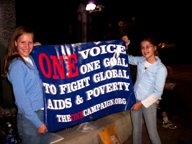
The other day after Mass I was discussing global hunger with a fellow parishioner, and this person's response was that the problem exists only because "thug governments" prevent the distribution of food aid.
One must admit there is a little bit of logic in that statement. The free flow of food, medications, water and other supplies would be very helpful in easing famine in Darfur, Niger and North Korea.
What I tried to explain to my fellow parishioner, however, is that there is a great distinction between famine and systemic hunger, which is the result of poverty.
Why aren't we as a society doing more to alleviate poverty, which is one of the principles in our Christian faith (and for that matter in almost all religious traditions)? What role do our attitudes about economics and wealth have in our failure to respond?
The article is not necessarily an indictment of our economic system; rather it raises concerns on how we've allowed capitalism to dictate even the way we respond in faith.
"Capitalism, of course, is an economic system, a particular method for allocating resources by price and ability to pay," says Hilfiker. "One can argue for or against the benefits of that economic system, but I don't want to get into that argument here. Nor do I intend to rail against consumerism (although it's worth railing against) or detail the failure of the free-market system to care for the poor or protect our environment, although those, too, are deadly serious issues."
Hilfiker goes on to say: "This focus on profit, on earning money, has mushroomed beyond the sphere of economics to become central to our understanding of life itself. The purpose of work is to make money." By placing such emphasis on making money, argues Hilfiker, the principles that Christ taught in the Gospel are often set aside. "Activities that are not financially remunerative, even those essential to societal well-being, are not valued," says Hilfiker, who works as a physician in a poor community in an inner city.
Hilfiker's article is long, but it offers some very compelling points. The bottom line is in the summary: "The function of religion in the human community should be to call forth our best and highest selves," says the author. "As an economic system, capitalism may or may not serve us well. As a religion, especially an unnamed one, it is disastrous."
The Rev. William Byron, S.J., who collaborated with Art Simon in founding Bread for the World, equates our societal drive for profits with gluttony. "Profits to a company are like food to a person," Father Byron said in a program called The Jesuits, which was part of the PBS series Religion and Ethics newsweekly. "Whoever said you have to maximize your profits quarter, after quarter, after quarter?
Father Byron, who has taught economics at Loyola College in Baltimore and Georgetown University in Washington, emphasizes the importance of bringing the values that Christ taught in the Gospel into our daily lives. "It would be folly for somebody, a person of faith, to say, 'Holy Spirit, you have to wait out here, I'm going in, I got real work to do.' And leave outside, love, joy, peace, patience, kindness, generosity, faithfulness, gentleness, [and] self-control. Doesn't work. They belong in the workplace. And the workplace becomes more fully human."
The U.S. Conference of Catholic Bishops also addresses the issue in a pastoral letter entitled A Decade after Economic Justice for All. The pastoral letter was issued in 1995 on the tenth anniversary of Economic Justice for All, an earlier statement by the bishops which promoted the concept of Preferential Option for the Poor.
Our pastoral letter insisted that the measure of our economy is not only what it produces, but also how it touches human life, whether it protects or undermines the dignity of the human person, and how it promotes the common good," said the bishops, in reference to their earlier letter.
"Ten years after Economic Justice for All, the nations needs to hear its message once again and respond to its continuing challenges. At a time of great national debate, the Catholic community must continue to speak for poor children and working families."
The bishops don't disagree with the right of Congress to revise some of our government policies, but they say any decision should keep the plight of the poor as the highest priority.
"Our nation must reduce its deficits, reform welfare, reshape its foreign assistance and reorder national priorities," said the bishops. "However, the fundamental moral measure of these policy choices is how they touch the poor in our midst, especially children and families who struggle against economic, social and moral pressures which leave them poor and powerless."
(Photo: Kyra Ellis Moore and Ella Wood hold The ONE Campaign Banner at local interfaith vigil on Sept. 15, 2005)
No comments:
Post a Comment